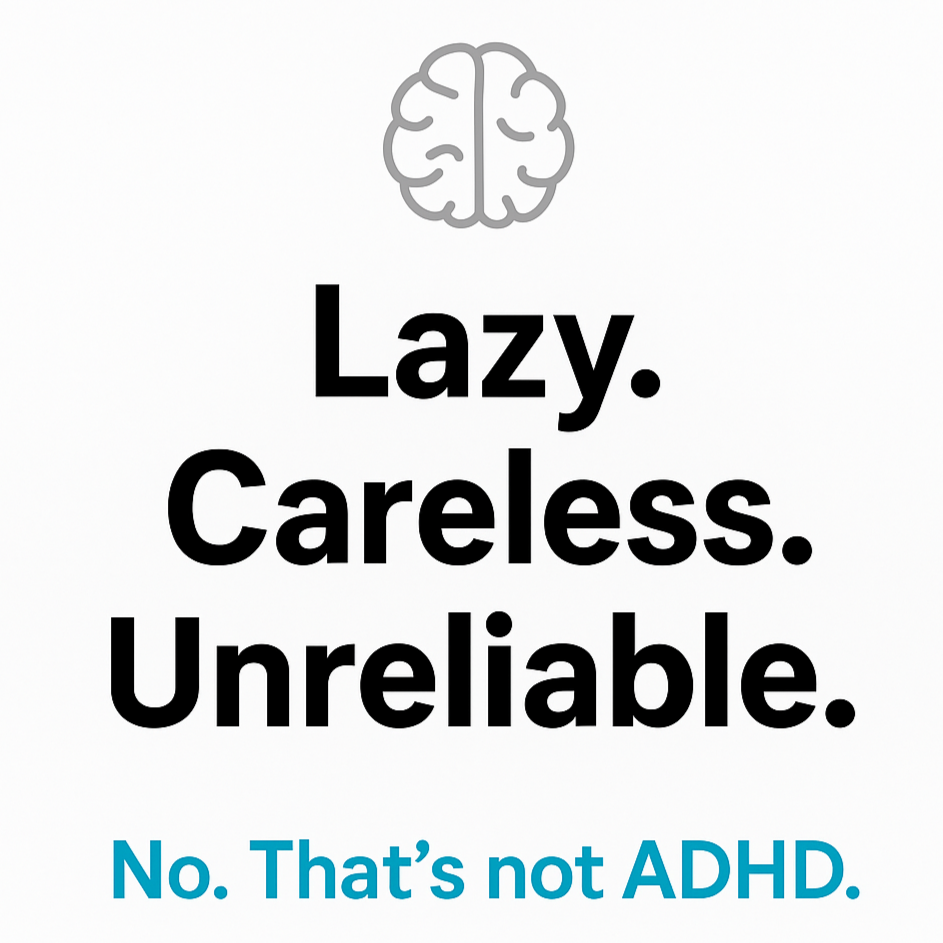ADHD Is Not a Moral Failing
“Lazy.”
“Inconsiderate.”
“Unreliable.”
“Selfish.”
“Careless.”
“Undisciplined.”
How many of those words have been used to describe you? And how many times have you used them on yourself?
If you’re living with ADHD, chances are you’ve heard them more than once. You may have even started to believe there’s some truth in them. After all, if you just tried harder, if you just cared enough, then surely you could change, right? And when the same struggles keep showing up—missed deadlines, forgotten plans, unfinished tasks—it can feel like proof that there’s something wrong with your character.
On top of that, we’re often told that a “true apology” requires a real change in behavior. So when the cycle repeats, it can feel like you’re not only lazy and unreliable, but also unapologetic or dishonest.
But here’s the truth: ADHD is not a moral failing.
The Stigma of ADHD Behaviors
For people who don’t experience ADHD, certain behaviors can look like carelessness or selfishness. If someone without ADHD is always late, it might mean they truly don’t value other people’s time. But for someone with ADHD and time blindness, lateness is often the result of losing track of time or underestimating how long things take—not a lack of care. If you didn’t care, you wouldn’t feel so anxious or guilty about showing up late.
The problem is that outsiders often assume intent behind ADHD behaviors. Forgetting a birthday, misplacing keys, struggling to finish tasks—these get framed as choices rather than symptoms. Instead of being met with understanding or support, people with ADHD are frequently met with judgment, criticism, or isolation.
It’s Not About Trying Harder
ADHD struggles aren’t the result of laziness or a lack of discipline. People with ADHD don’t forget appointments or zone out in meetings because they enjoy the fallout. They don’t sit in task paralysis because it’s fun. Their brains simply don’t respond to willpower and effort in the same way that neurotypical brains do.
Executive dysfunction, time blindness, task paralysis, emotional dysregulation—these are neurological challenges, not personal flaws. Without the right tools and strategies, the brain can’t meet the demands of work, home, or relationships, no matter how much someone “tries harder.”
Thriving With ADHD
The good news? When people with ADHD are given systems that actually support how their brains work, everything changes. External reminders, body doubling, visual schedules, structured routines, and compassionate accountability can help bridge the gap between intention and action.
With the right supports in place, someone with ADHD can not only meet the expectations of daily life but also thrive—bringing creativity, resilience, empathy, and innovation to the table. ADHD does not define a person’s worth. It simply means their brain needs a different approach.
So the next time those old words creep back in—lazy, selfish, careless—pause and remember: struggling with ADHD is not a reflection of your character. It’s a reflection of your neurology. And you are not broken.
But challenging our internal narrative can be hard. If you’re finding that you’re still fighting those negative thoughts, reach out and see if maybe I can help you.
